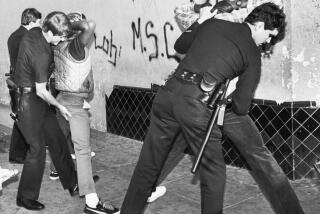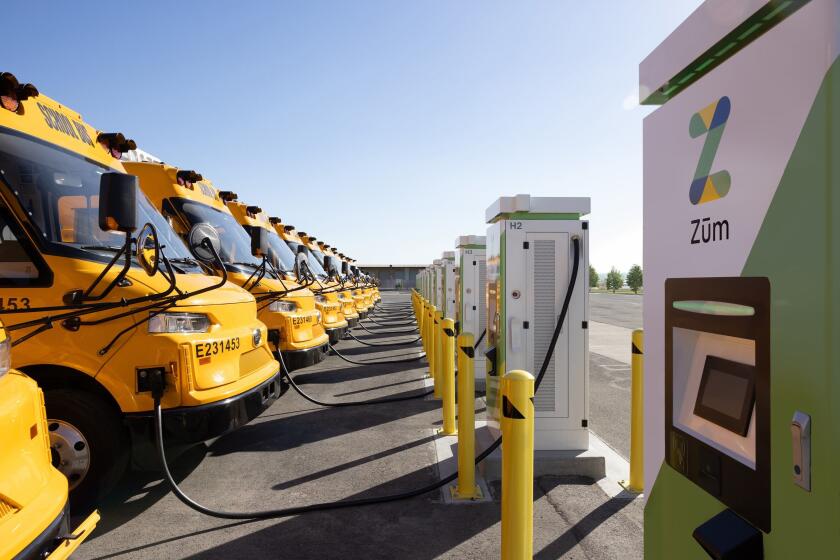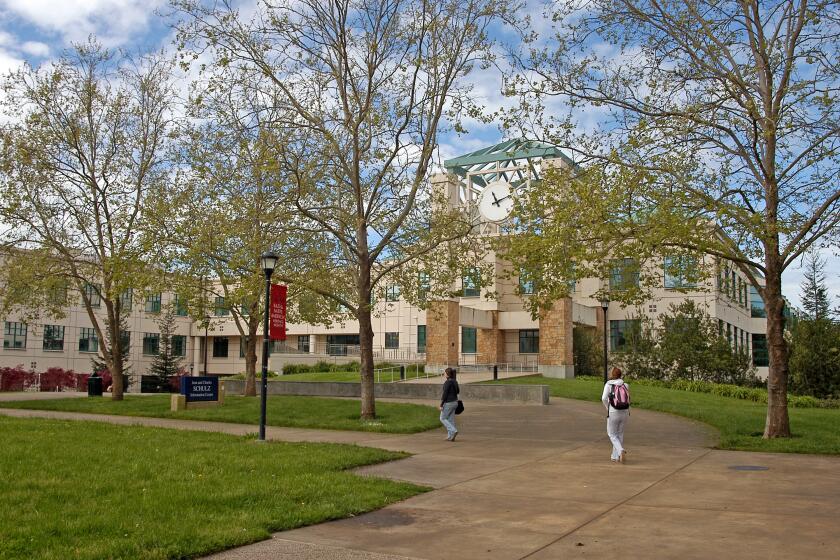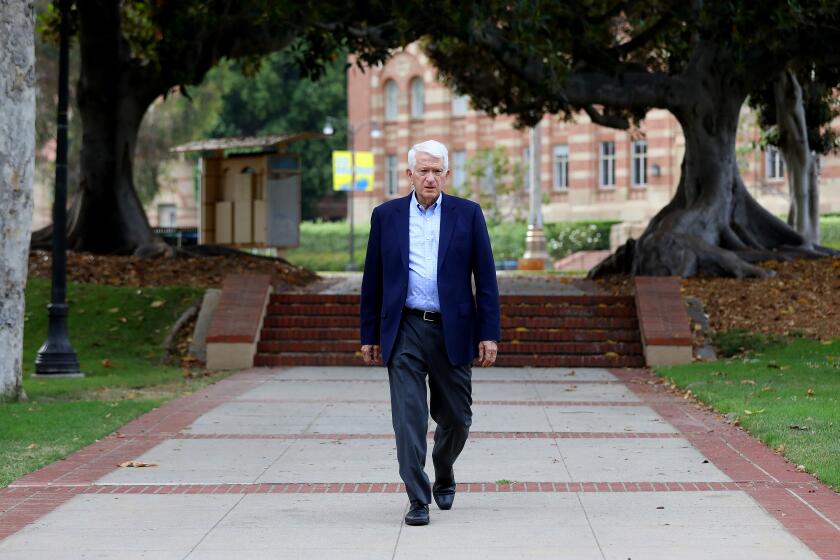L.A. Truancy Law Upsets Students, Pleases Officials : Schools: Fines or loss of driver’s license may deter class-cutters, some teen-agers concede. A similar ordinance in Monrovia is called a success.
Lectures from her father didn’t do the trick. Being banned from her club softball team wasn’t persuasive. But her ditching days just might have to end now, Angelica Saenz said, if the city of Los Angeles follows through with an ordinance that could subject wayward students to $50 fines, long hours of community service or the potential loss of driver’s licenses for missing school.
“My dad has just been waiting for something like this,” said Saenz, a sophomore at Venice High School, rolling her eyes slightly. “He was thrilled when he told me about it.”
Most parents, teachers and school administrators said Wednesday that they have high hopes for subjecting truant students to criminal prosecution for missing school. The law, which received initial City Council approval Tuesday, still needs final council approval and Mayor Richard Riordan’s signature. It would take effect in 30 days, perhaps just in time for the waning days of the school year.
But as word of the proposal filtered through Los Angeles Unified School District campuses, students could find a lot of reasons why the truancy crackdown would be unfair and a lack of consensus on whether it would work.
“It all depends on how well they enforce it,” said Tom Sano, a senior at Venice High. “Right now they have a lot of rules, but they don’t really pay any attention to them.”
Objections to the law--modeled on one now in effect in the San Gabriel Valley community of Monrovia--ranged from the puerile to the sociological to the constitutional.
“It sucks. What if we don’t want to go to school?” said Mitzi Ayala, a 15-year-old Belmont High School sophomore, who spoke for those who don’t know, or care, about the state’s mandatory schooling law.
Striking a more substantial chord, Belmont High senior Juan Huezo said police will have to be careful not to target students who are late for school for good reason. “Some kids have to help out their parents by working or taking care of their younger brothers and sisters,” Huezo said. “There’s a lot of kids like that around here.”
Back in Venice, five young truants who spread themselves over several booths at a Burger King worried that the ordinance might be used as a pretense by police to hassle them.
“They will just see you walking in a group and pull you over. It’s happened to me a couple of times anyway,” said one Venice High junior, who declined to give his name. “That’s not fair. You might have a free period or day.”
Students at crowded inner-city schools that are on multitrack schedules said they fear that they will be targeted more often because police don’t understand when they legitimately are on vacation.
On the Eastside, Garfield High School Principal Maria Elena Tostado agreed. At any given time, a third of her school’s student body is not in class because of the year-round system, she said. Combined with students who are on vacation at nearby Roosevelt High School, as many as 3,200 teen-agers could be legitimately on the streets on weekdays, Tostado said.
“How are you going to know who is off track or on?” Tostado said, although she added that fines should be effective once the right students are targeted.
Police have said that they will keep statistics to assure themselves and the City Council that the law is not targeting any ethnic group or geographic area. They said they will be contact schools to assure that those who are legitimately out of class do not receive citations.
However, at least one veteran juvenile officer said the truancy checks will be time-consuming.
“I have great reservations about how long it’s going to take to find out if the kid is on or off track at school,” said Detective Dick Heidesch, juvenile coordinator with the Los Angeles Police Department’s Newton Division, adding that he still appreciates any effort to deal with young people more strictly. The division’s school car and two officers monitor 25 schools in a large tract of South-Central Los Angeles. “It’s been our experience in the past that it takes a long time to get that information,” Heidesch said.
Students were divided on which penalties would be most persuasive. Too poor to even think of owning a car, many students worried more about fines. Others in more affluent areas, such as the San Fernando Valley, blanched at the idea of losing their driving privileges.
“Taking away someone’s license is way too strict,” said Sabrina Alvarez, 16, of Chatsworth. “I don’t think it’s fair.”
*
As oppressive as many students complained the law would be, they were divided about whether it would really take truants off the street. Inveterate slackers, who regularly leave Venice High to convene at the nearby Burger King and Taco Bell, pledged that they would not be dissuaded from their favorite pastime.
“I wouldn’t pay a fine,” said one girl, a junior who sported a baggy basketball jersey. She boasted that she misses school more often than not and has never been caught for forging her mother’s signature on notes to the attendance office. “They don’t check,” she said, “as long as you put a phone number on there.”
Other students, though, predicted that the bravado might fade when the courts and, worse yet, parents are drawn into the picture by police.
“If I ditched and I heard about the new law, I wouldn’t risk getting caught. I’d get in a lot of trouble at home,” said Nicole Horn, 16, of Chatsworth.
In Monrovia, 80 students have been cited since the fall and subjected to fines of $135 and up or ordered to perform 27 hours of community service, such as shelving library books and painting over graffiti.
Police Officer Jim Hunt said that city’s law, which took effect last fall, “helps attendance a lot.”
Monrovia High School Principal Lois Wurmbrand said truancy is still a “big problem.” But, she said, “I believe it’s making an impact. Kids are aware they can be caught. They are following our rules more stringently, having passes to be off campus and that sort of thing.”
Confirmation of those beliefs, though, won’t be available until truancy statistics are compiled in Monrovia at the end of the year.
Several Monrovia High students said they are skeptical. But one 16-year-old who had just been cited Wednesday for failing to return from lunch promptly said the law had made an impression on him.
“If I had known about it, I wouldn’t have been late,” said the boy as he accepted his ticket, telling a reporter: “No one will ditch out of school. They will stay in school.”
Times staff writer Isaac Guzman and correspondent Deborah Sullivan contributed to this story.
More to Read
Start your day right
Sign up for Essential California for news, features and recommendations from the L.A. Times and beyond in your inbox six days a week.
You may occasionally receive promotional content from the Los Angeles Times.







